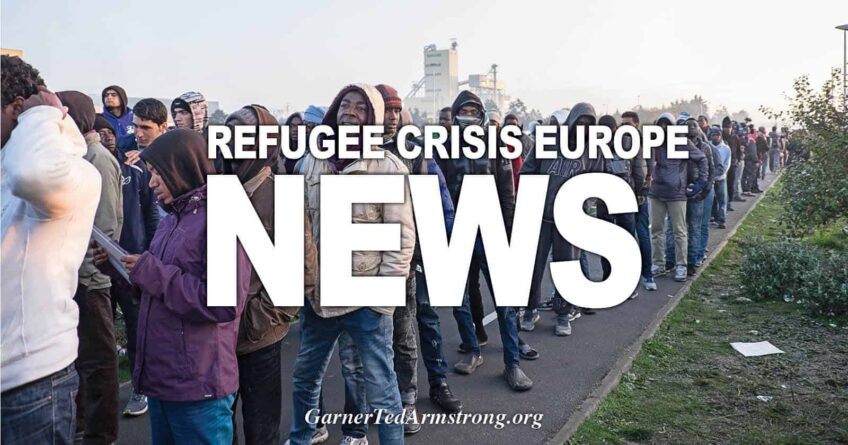For tens of thousands of asylum seekers, living in Cyprus is a daily struggle. Isiaka and Christelle are just two out of thousands of migrants and refugees battling with meeting basic needs ranging from housing to employment to having food to eat on the small Mediterranean island, as more migrants keep arriving.
“This paper is very important. Don’t forget to bring it back to me.” These are the words that Isiaka is told as a young charity worker from the Kisa NGO waves a document in front of him and slips it into a plastic pouch. Isiaka nods as he readjusts his cap and starts to leave the office. At the door, he quickly turns around to pick up a large carton of orange juice he had left there.
“I mustn’t forget this. It is my only meal of the day,” he explains.
Each day, more and more people just like Isiaka come through the doors of the charity, which specializes in legal aid for asylum seekers. In recent years, Cyprus has become a key destination for thousands of migrants from Syria, Bangladesh, India, Cameroon and the Democratic Republic of Congo (DRC).
For the past two years, arrival numbers have increased considerably after hitting a low during the first months of the COVID-19 pandemic in 2020. According to official figures, nearly 14,000 asylum applications were registered in the country in 2021 — compared to 7,821 in 2019. Those figures could still even be “far exceeded in 2022,” chief of staff at the Ministry of Interior, Loizos Michael, says.
Michael adds that asylum seekers now represent a total of 5% of the island nation’s population, which compares to 1% or less in other European Union (EU) countries. Between January and March 2022 alone, 5,066 asylum applications have already been filed in Cyprus.
Elizabeth Kassinis, head of the Caritas migrant center in in the capital Nicosia, agrees that in the past three years, “the situation has changed. There are many more arrivals in Cyprus. Especially because of the regulations in Greece and the closure of the Balkan route.”
“The administration was not prepared for this, it is completely overwhelmed,” she adds.
‘Living hell’
The vast majority of refugees and migrants coming to Cyprus arrive through Turkey. After usually obtaining a student visa for Turkey, they take a flight to Ercan, which is a town in the Turkish-occupied northern part of the island. They then cross the Green Line, a UN-controlled buffer zone, to enter the internationally recognized southern part of the island, which is a member of the EU.
Then they have to spend a few weeks or even months spent at the Pournara reception center to get to lodge their application. Once that is done, they have to leave the camp. This is where asylum seeker say their ordeal begins — which many of the refer to as a “real hell.”
“The first problem is housing,” Kassinis explains, highlighting that when the asylum seekers leave Pournara, they have nowhere to go. The government in Cyprus does not provide accommodation for asylum seekers. There is only space for a few families and single women at the Kofinou reception center in southern Cyprus.
Some of them eventually manage to find some kind of roof over their heads by calling on members of the local communities to help them. But many others, like Isiaka, end up sleeping rough on an empty stomach.
“For the past few days, he has been returning to Pournara every night just in order to not spend the night alone. “I take the bus from Nicosia and go there for the night. I sleep on the ground, near the entrance of the camp, with other Africans. And then the next morning, I go back the other way,” he told InfoMigrants.
Six months ago, Isiaka left Nigeria’s central Kogi State to migrate to Cyprus with hopes of finding a better life away from persecution. Now, he walks the streets of the capital looking for a job all day long, without hope or much available to eat.
“I feel like I will never make it. When I apply for a job, they don’t even let me speak. They just say, ‘Leave, leave, leave!’ It’s because I’m black,” he says, adding that even animals are treated better that that.
‘I don’t eat often. I’m always thirsty’
In Cyprus, asylum seekers are allowed to work while their cases are being processed. But the criteria for obtaining a work permit are “very selective,” Elizabeth Kassinis explains.
“You have to be able to prove that you have an address. But that’s a catch-22 situation: you want a job to pay for housing, but they ask you to have housing to work.”
The only help they receive from the Cypriot government is monthly payment of €261 as an allowance. But faced with the exponential increase in applications in recent months, authorities are overwhelmed and seem to be slow in reacting.
Many asylum seekers have to wait months before receiving any cash. Each day, there are long queues of migrants waiting for their payment in front of the social services office in Nicosia. The office opens at 6 am, however, to be sure they manage to get in before it closes again at 2 pm, many migrants spend the night sleeping on the sidewalk in front.
Read more: Cyprus: ‘Miserable’ conditions for children in migrant camp
Christelle is one of many who camp out outside the office doors night after night. The 42-year-old Congolese national has not received any benefits since January because of the administrative backlog.
In constant survival mode
“Without government aid, I have no income, nothing, because it is impossible to find a job here. So I don’t eat very often, except for rolls which cost two euros. I am always thirsty, which is making me feel sick,” she told InfoMigrants.
“I am really in deep misery, I don’t even have enough to buy a sanitary napkin. Instead, I use toilet paper.”
Many asylum seekers in Cyprus face similar predicaments — for two, three or in some cases even four years while their asylum application is being processed. The government announced last year that it was working towards reducing the wait to 50 days — but to no end, thus far.
The Cypriot government has turned to the EU, looking for help to cope with the situation. First it requested permission to suspend asylum applications for a certain amount of time so it could catch up with the backlog. However, the European Commission refused this idea.
On February 21, Cyprus finally managed to sign a memorandum with the EU, guaranteeing support. The agreement will free up EU funds to expand capacity at the Pournara reception center and build new accommodation centers as well as to launch a recruitment drive to attract more immigration officials.
Read more: EU, Cyprus strike ‘milestone’ deal on asylum seekers
Heavy patrols along the Green Line
While this sounds like there will be improvements to migrant reception in Cyprus, the majority of direct measures taken in recent months by the Cypriot government tell a different story.
For the past year, the government has erected barbed wire fences at certain points along the 184-kilometer Green Line. Loizos Michael explains that the government decided that “it was time to deal with this zone.”
Further fortification are also planned there, including a monitoring system — developed in collaboration with Israel — which will be deployed starting August 2022. As part of the overall measure, cameras will also be installed along the border, while security forces will be added to patrol the Green Line.
[Disclaimer]





